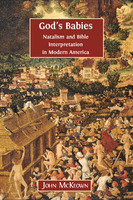God's Babies
Natalism and Bible Interpretation in Modern America
| dc.contributor.author | McKeown, John | |
| dc.date.accessioned | 2018-04-03 00:00:00 | |
| dc.date.accessioned | 2020-04-01T12:52:21Z | |
| dc.date.available | 2020-04-01T12:52:21Z | |
| dc.date.issued | 2014 | |
| dc.identifier | 646653 | |
| dc.identifier | OCN: 899280623 | en_US |
| dc.identifier.uri | http://library.oapen.org/handle/20.500.12657/30346 | |
| dc.description.abstract | The human population's annual total consumption is not sustainable by one planet. This unprecedented situation calls for a reformation in religious cultures that promote a large ideal family size. Many observers assume that Christianity is inevitably part of this problem because it promotes "family values" and statistically, in America and elsewhere, has a higher birthrate than nonreligious people. This book explores diverse ideas about human reproduction in the church past and present. It investigates an extreme fringe of U.S. Protestantism, including the Quiverfull movement, that use Old Testament "fruitful" verses to support natalist ideas explicitly promoting higher fecundity. It also challenges the claim by some natalists that Martin Luther in the 16th century advocated similar ideas. This book argues that natalism is inappropriate as a Christian application of Scripture, especially since rich populations’ total footprints are detrimental to biodiversity and to human welfare. It explores the ancient cultural context of the Bible verses quoted by natalists. Challenging the assumption that religion normally promotes fecundity, the book finds surprising exceptions among early Christians (with a special focus on Saint Augustine) since they advocated spiritual fecundity in preference to biological fecundity. Finally the book uses a hermeneutic lens derived from Genesis 1, and prioritising the modern problem of biodiversity, to provide ecological interpretations of the Bible's "fruitful" verses. | |
| dc.language | English | |
| dc.subject.classification | thema EDItEUR::Q Philosophy and Religion::QR Religion and beliefs::QRA Religion: general::QRAM Religious issues and debates | en_US |
| dc.subject.classification | thema EDItEUR::R Earth Sciences, Geography, Environment, Planning::RN The environment::RNA Environmentalist thought and ideology | en_US |
| dc.subject.other | fecundity | |
| dc.subject.other | ecology | |
| dc.subject.other | biodiversity | |
| dc.subject.other | family | |
| dc.subject.other | bible | |
| dc.subject.other | christianlity | |
| dc.subject.other | natalism | |
| dc.subject.other | Augustine of Hippo | |
| dc.subject.other | God | |
| dc.subject.other | Old Testament | |
| dc.subject.other | United States | |
| dc.title | God's Babies | |
| dc.title.alternative | Natalism and Bible Interpretation in Modern America | |
| dc.type | book | |
| oapen.identifier.doi | 10.11647/OBP.0048 | |
| oapen.relation.isPublishedBy | 23117811-c361-47b4-8b76-2c9b160c9a8b | |
| oapen.collection | ScholarLed | |
| oapen.pages | 260 | |
| oapen.remark.public | Relevant Wikipedia pages: Augustine of Hippo - https://en.wikipedia.org/wiki/Augustine_of_Hippo; Bible - https://en.wikipedia.org/wiki/Bible; Fecundity - https://en.wikipedia.org/wiki/Fecundity; God - https://en.wikipedia.org/wiki/God; Natalism - https://en.wikipedia.org/wiki/Natalism; Old Testament - https://en.wikipedia.org/wiki/Old_Testament; United States - https://en.wikipedia.org/wiki/United_States |

